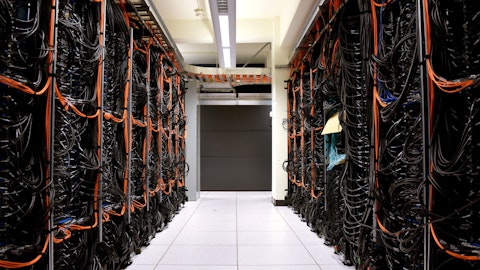Neil Hunn: Sure. So foundry, for those that aren’t familiar with it, it’s a business and media entertainment, that’s used in post-production for a process called compositing, where you take a live action image and a computer-generated image and push them together in the single scenes. So think Game of Thrones, pretty much every seen in Game of Thrones was used as composite with foundry software as is almost any high-end production or streaming series. So as it turns out, I think this is the first time since 1960. We’ve had both a writer’s trike and an actor’s strike concurrently. So the current production of content is ceased. There is still a very active pipeline of things in post. And so it has no impact currently on foundry.
The current expectation is the strikes will be resolved this year. And if that’s the case, then there’ll be very little impact foundry next year as they’ll be back in production and sort of catch up. If it extends beyond this year, then yes, foundry will likely be negatively impacted to some extent next year. So that’s just a lot of item for us. And your second question, Foundry this year commenced the transition to a subscription pricing model for their core product of Nuke. So this year, there are — you can buy it either as a license or a subscription. As we mentioned, about 60%, north of 60% of the new units were sold on a subscription basis this year. So it’s a nice transition ahead of our plan. ARR is growing double digits. And then beginning next year, it will be 100% subscription opportunity to buy in the license format.
So going a little bit better than planned.
Christopher Glynn: Thanks for that.
Neil Hunn: You bet.
Operator: Thank you. And the next question comes from Steve Tusa with JPMorgan.
Steve Tusa: Hey, guys. Good morning.
Neil Hunn: Good morning.
Jason Conley: Good morning.
Neil Hunn: Are you okay?
Steve Tusa: Am I okay?
Neil Hunn: Yes, okay. You sound a little froggy there, okay.
Steve Tusa: No, no, no, no, it’s a little bit early. Thanks for the [Multiple Speakers] I appreciate it. So just a couple of things. Can you just talk about what you expect for third quarter free cash? Maybe just talk about the deferred revenue drag you guys have had in the first-half, what’s driving that? And then just what are organic bookings year-over-year for the software businesses in the second quarter? Thanks.
Neil Hunn: Yes. So we mentioned before, Frontline is a new dynamic, right, for Roper, where all of their renewals happen in the third quarter. So we’re already tracking really strong just month-to-date, if you will, for the renewals there. And they actually consumed cash in the first-half, just to give you a perspective on that. I mean also, I think we historically have very strong second-half seasonality. So that, plus just some of the — I think some of the timing of working capital in the second quarter points to a much better second-half. First-half, we usually — we pay out incentive. We had — this year, we had that legal settlement. So that points to sort of that seasonal change for this year. And so we’re still on track to deliver north of 30% of free cash flow to revenue.
And then you asked about the trends on. So if we kind of look at enterprise software bookings, and it was up sequentially a bit and up year-over-year. Not quite as strong as the first quarter, maybe like low-singles in area, which is about in line with what we had. It’s obviously embedded in sort of our slowdown for the second-half for new activity.




